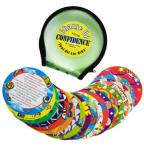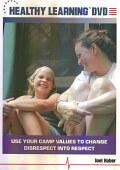

Find More Info About
Dr. Haber's Anti-Bullying
Camp Programs Here »
Be sure to check out our Bully Coach DVDs for Camp Staff
Anti-Bullying Resource Library - Respect U.
Lessons Learned
by Dr. Joel Haber
For several years, I have trained upwards of 10,000 counselors and camp staff, both at the beginning of the summer and mid-summer (when they shared issues and concerns). I also surveyed counselors, to assess their experiences with and attitudes towards bullying. Here’s what I discovered…
- Almost all counselors have experienced bullying – either as victims, bullies or observers
- Less than 10% of counselors who had been bullied and reported to an adult felt that they had gotten help
- Many counselors are in a role of authority for the first time when they are at camp. Some are not yet comfortable with their leadership roles in intervening in bullying situations or talking about specific issues with senior staff or directors (because of fear of negative evaluation and/or lack of belief that it will help)
- Bullying at camp may include counselor-counselor bullying, as well as situations where campers bully staff members
- Bullying is not just limited to camp season. Exclusionary behaviors and cyber-bullying may continue year-round, which makes monitoring and dealing with bullying behaviors more difficult
Therefore…
- Camp directors and staff need to be consistently proactive and involved in establishing, reinforcing, communicating and training around the topic of bullying – with staff, campers, and parents
- Counselor screening should include an assessment of “bully attitudes” among prospective staff members – especially those in supervisory positions
- Counselors must be trained to respond quickly, effectively and compassionately when they see bullying happening at any level
- Role playing can be a particularly effective training tool – especially using real-life examples
- Establishing and rewarding “model” behavior among staff and campers is critical to building a bully-proof camp.
copyright © 2009-2011 by RespectU.com. All rights reserved.
terms of use - privacy policy

